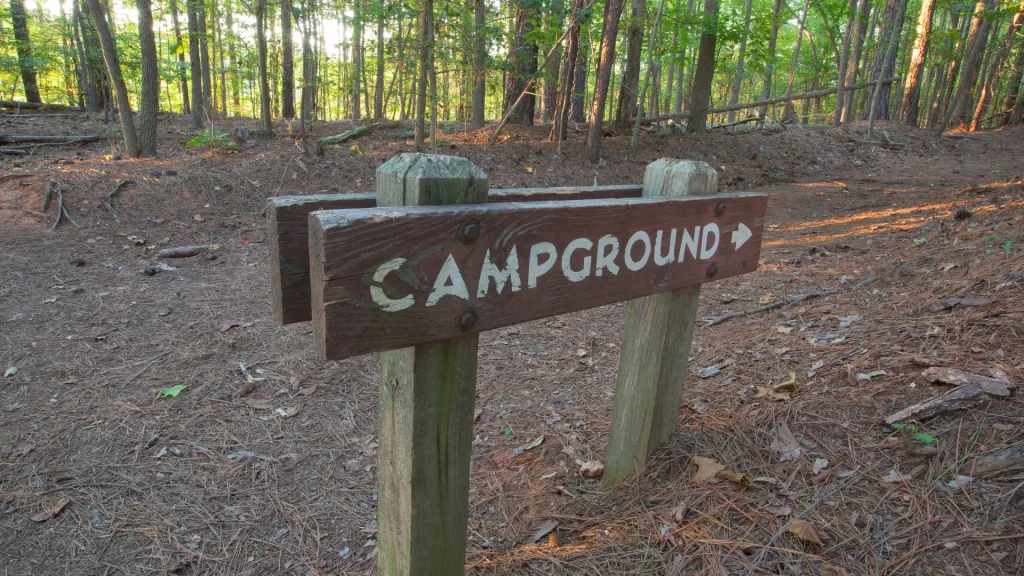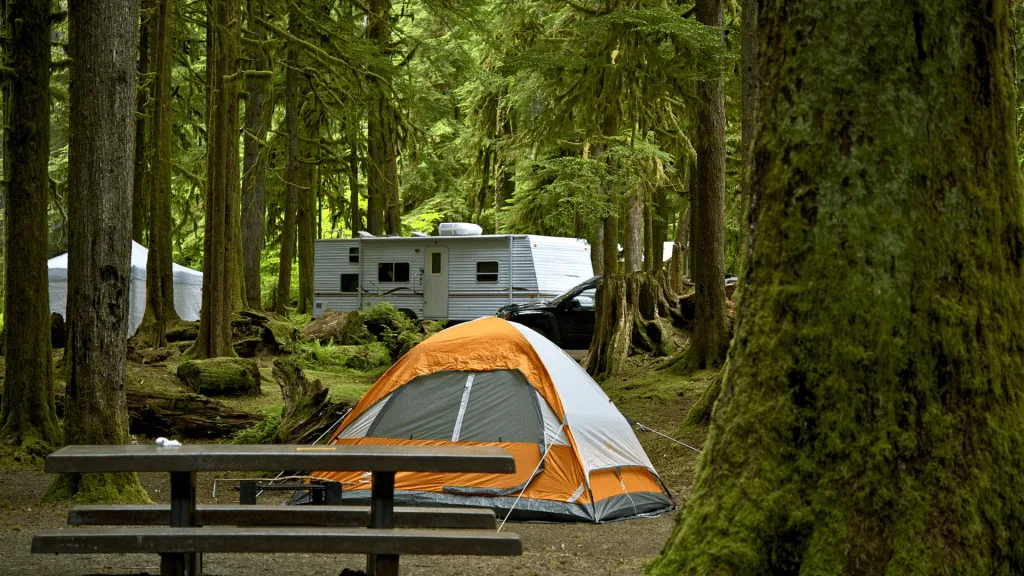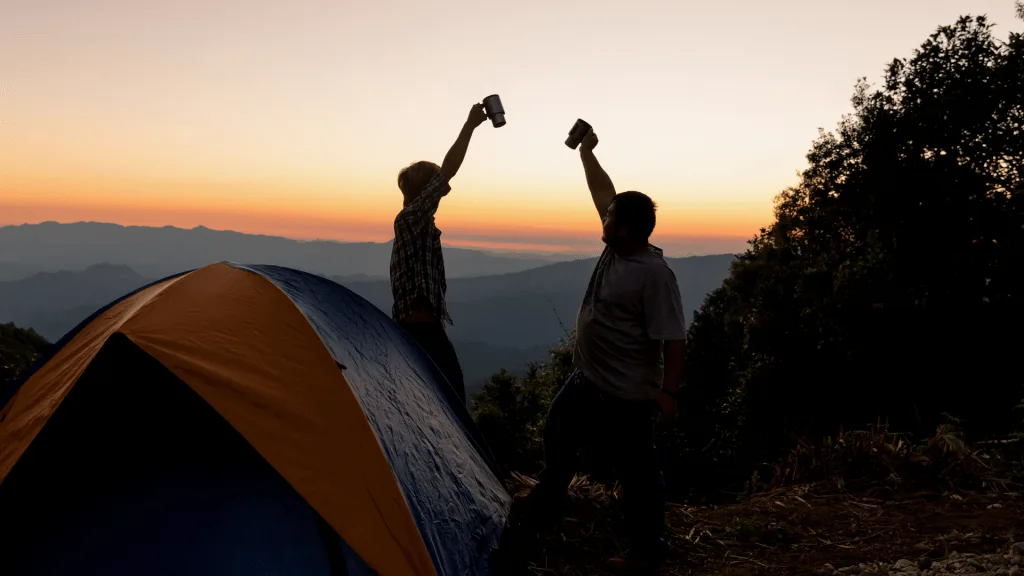Being out in nature benefits your physical and mental health, and learning your best camping style is essential. There’s something about reconnecting with the natural world and disconnecting from devices that bring healing to our bodies and minds.
But there are many different ways to do this. You can pitch a tent, relax in an RV, drive through the desert, or even sleep in your car.
So which camping style is best for you?
Let’s find out!
What Are the Different Styles of Camping?
There are lots of different campers who enjoy different styles of camping. One isn’t better than the other as they appeal to diverse types of people.
Some travelers prefer the great outdoors in remote areas and want to get to the deepest place in a National Forest to escape the world and enjoy solitude in their tent.
Others prefer the amenities of a swimming pool, mini golf course, basketball court, and clubhouse and enjoy a relaxing weekend with fun and entertainment at an RV resort. Let’s look at each of these different camping styles in more detail.
RVing
RVing is generally referred to as “overnighting” in a campground or RV park, although sometimes RVers will boondock in dispersed camping locations, too. Regardless of the surroundings, RVs are recreational vehicles created to be tiny homes on wheels.
They range in size from under 20 feet to over 40 feet in length and can have residential appliances, hand-crafted cabinetry, and washer and dryer hookups.
Travel trailers, fifth wheels, toy haulers, and motorhomes are part of the RV family. People consider RVing as the most luxurious of the camping options.
The Tent Camping Style
Tent camping refers to pitching a tent in a campground or designated campsite. Often, people who want to enjoy the amenities of this type of campground but don’t own an RV will make a reservation for a tent site.
They can access playgrounds, swimming pools, laundry facilities, and more. But instead of sleeping in an RV, they’ll sleep in a tent on a much smaller site. Tent campers usually spend an entire weekend or week in one location.
Pro Tip: Stay safe by not committing any of these 7 Deadly Sins of Tent Camping.
Backcountry Camping
Like tent camping, backcountry camping is when hikers pitch a tent for an overnight stay. However, the difference between tent camping and backcountry camping is that backcountry camping is on public land in a remote location. Also, backcountry campers generally move locations every day/night.
Hikers will fill a backpack with a tent and essential gear and head out on a several-hour-long hike to reach their campsite. Then they’ll get up the following day and do that same thing again to reach another location. Many hikers along the Appalachian Trail are backcountry campers.

The Car Camping Style
Many people think car camping is sleeping in your car, but it’s more than just pulling into a campsite and leaning back in the seat for the night. You drive up to a spot, but it’s more like tent camping once you arrive.
Some people prefer to blow up an air mattress, which is a great way to camp in your car if you can lay down all the seats for a large flat surface.
Others will pack a pad – like a sleeping bag pad – and extend their legs through the trunk for additional room. Car camping puts you close to a trailhead or fishing hole for easy access.
Pro Tip: We took a closer look at How To Camp Out of Your Car, Legally.
Overlanding
Whereas RVing and tent camping are more about the destination than the journey, overlanding is about exploration and adventure. People who enjoy overlanding like the thrill of travel, off-roading, and venturing into remote locations.
Overlanding requires high-clearance vehicles with all-terrain tires and solar power. Travelers venture along sand, mud, and snow in a self-contained truck and spend the night wherever they choose to park it.
The Survival Camping Style
Finally, survival camping is the most challenging camping style because you’re dropped off in a remote location with very few supplies. With limited resources, you have to be able to survive in the wilderness. It’s certainly not for inexperienced campers. You’ll have to catch your own food, build your own fire, and sometimes build your own shelter. The point of survival camping is to reconnect with nature.

Which Type of Campground is Best for You?
If you enjoy RVing, tent camping, or car camping, you’ll be staying in some type of campground. Sometimes backcountry campers will also sleep in designated primitive campsites. Overlanding and survival camping usually don’t happen in a maintained campground.
RV Resorts
RV Resorts tend to be the most expensive overnight option for RVers because of the number of amenities included. Some RV resorts have on-site restaurants and bars, fitness centers, lazy rivers and swimming pools, daily activities, and more. Sites are often paved with full hookups, a fire ring, and a picnic table. Sometimes sites will also have a patio space. This is RVing in luxury.
Privately Owned Campgrounds
Most campgrounds around the country are privately owned. They aren’t RV resorts because they don’t offer the luxuries and amenities of such locations. But most of the time, these campgrounds still provide full hookups, a fire ring, and a picnic table. The sites tend to be gravel, grass, or dirt. The campground may have a swimming pool, clubhouse, or basketball court.
National Park Campgrounds
Most National Park campgrounds don’t provide full hookups, and many don’t offer any. So RVs must be fully self-contained and provide their own electricity and water. National Park campgrounds generally restrict the size of an RV as well. These locations can be challenging to reach, and the roads aren’t usually suitable for navigating large RVs.
However, that doesn’t mean no National Park campgrounds are open to larger rigs. You’re just more likely to run into size restrictions here. But if you can get into one of these types of campgrounds, you’ll be in the middle of some of the most beautiful places in the country near trailheads and other attractions.
State Park Campgrounds
In contrast to National Park campgrounds, you’ll find more campgrounds available for larger rigs and more accommodations, including full hookups in state park campgrounds. But like National Park campgrounds, state park campgrounds offer stunning scenery and access to hiking trails, boat ramps, and other outdoor recreation.
Most of the time, you’ll find campsites farther apart at a State Park than at RV resorts or privately owned campgrounds. The camping environment also feels more like “camping” and less like “vacationing.”
Primitive Campgrounds
Primitive campgrounds are varied. Some will welcome car camping, tent camping, backcountry camping, or RVing. But primitive campgrounds will be rustic in that there will be no hookups.
Bureau of Land Management lands allow dispersed camping where RVers can pull off and park overnight or longer. People consider these primitive campsites because of their remote nature and lack of amenities.

How Do I Choose a Good Campsite?
Safety is one of the most critical factors in choosing a campsite, whether car camping, RVing, or tent camping. Do you feel safe here? Campendium is an excellent resource with a massive database of campgrounds and free overnight camping sites. Users can read camper reviews, which can be extremely helpful. How comfortable did other travelers feel here?
However, your camping style will also affect how you choose a campsite. If you’re tent camping, you’ll want to position your tent near water and trees. You also want to find a disturbed area where other tent campers have stayed. Be careful not to pitch your tent under large loose branches that could fall on you as you sleep.
On the other hand, if you’re RVing, the most important factor isn’t the direction the wind blows but finding a level site. Especially for RVs with propane refrigerators and slide-outs, the vehicle must be level for systems to run properly and avoid damaging the rig.
Is Camping Worth It?
With so many different campground types, you’re bound to find a camping style that fits you. If you prefer to cook your meals on a residential stove and sleep in a king bed, then RVing is the best fit.
If you’re looking to escape your work stressors and want to drive as far away into a National Forest as possible, overlanding may be your best option. But it’s essential to pick the style that fits you so that you enjoy your camping experience.
Discover the Best Free Camping Across the USA
To be honest with you, we hate paying for camping. There are so many free campsites in America (with complete privacy).
You should give it a try!
As a matter of fact, these free campsites are yours. Every time you pay federal taxes, you’re contributing to these lands.
Become a FREE CAMPING INSIDER and join the 100,000 campers that love to score the best site!
We’ll send you the 50 Best Free Campsites in the USA (one per state). Access the list by submitting your email below: